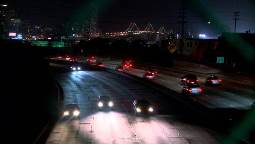Staying Safe After Dark
Although we may not hesitate to get behind the wheel during the day, night driving is an entirely different experience. Some drivers must avoid the road after dark because they suffer from night blindness. Regardless of your level of confidence, it is important to be cautious and recognize the potential for danger.
Staying safe on the road after dark can be a challenge, even for the most experienced drivers. According to the National Safety Council, traffic death rates are three times greater at night than during the day. Ninety percent of a driver’s ability depends on vision, which can be greatly impaired after dark.

The following can help you arrive safely at your destination...
-
Clean headlights, tail lights and the inside and outside of windows regularly – at least once a week.
-
Aim headlights properly so as not to blind oncoming drivers.
-
Do not drink and drive.
-
Avoid smoking while driving – nicotine and carbon monoxide can hinder night vision.
-
Turn on headlights even in early twilight – it will help make you more visible to other drivers.
-
Reduce speed. No matter how good your vision is, you cannot see beyond your headlights so maintain a speed that allows you to stop in that distance.
-
Avoid the glare of an oncoming driver with high beams on by watching the right edge of the road and using it as a steering guide.
-
Increase following distance.
-
Follow all safety rules even more diligently at night. Always carry flares or reflectors in case of a breakdown. Pull as far off the road as you can if you do experience car problems, use flares or reflectors to warn others.
-
Use high beams carefully. When no other traffic is approaching, high beams can extend your field of vision and therefore your opportunity to react to hazards. However, be cautious to turn high beams off when other drivers approach.
Most importantly, do not drive when fatigued. If you feel that you are at risk for falling asleep at the wheel, or cannot focus your attention on the road, pull over and rest. When on long overnight trips, plan to take frequent breaks for light snacks and exercise.









